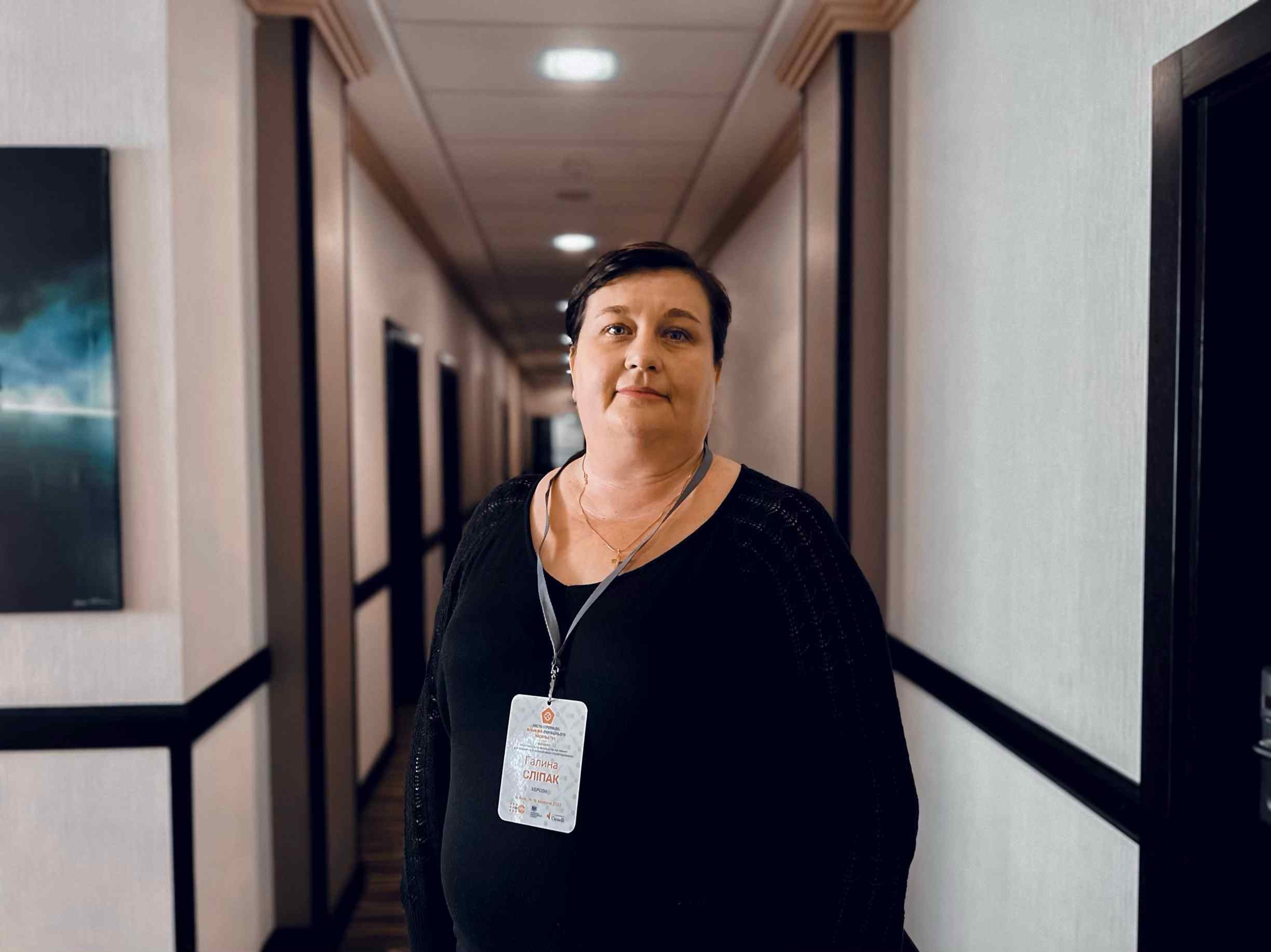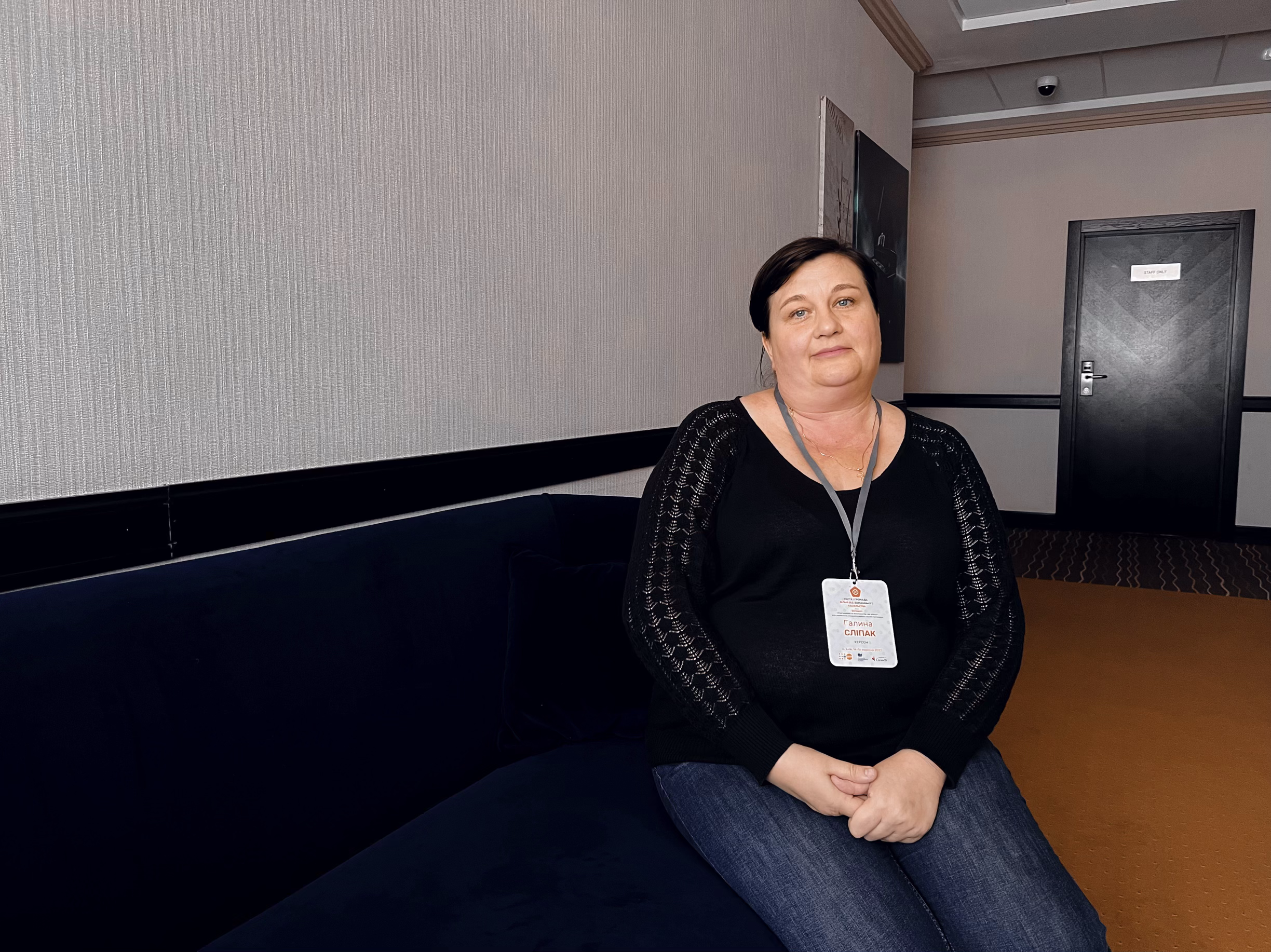Several people, dozens of calls, searching for volunteers, transporters and money to help her ex-client leave the temporarily Non-Government-controlled Kherson. It is just one of cases handled by a social worker of Kherson Municipal Social Center for Family, Children and Youth and former daycare center coordinator Halyna Slipak.
Prior to full-scale invasion of Russia they helped dozens of girls and women to counter violence. But when their native Kherson was seized, some social workers had to leave. Nevertheless, having been evacuated they still support their clients.
Halyna Slipak told UNFPA her story.
On February 24th Halyna was awaken by a message:
— Мom, it is the war.
After these words everything changed really fast. Halyna couldn’t keep up with the headlines: “Russian troops are coming from the Crimea”, “Russian troops are approaching Kherson”.
Halyna and her colleagues from daycare center for domestic violence survivors hadn’t leave their homes for about a week. Daycare center and crisis center for violence survivors were established in Kherson with UNFPA support in 2019. Hundreds of women suffering from domestic violence were provided with necessary support.
“The only thing we could do is just observing the situation and listening to the sounds of explosions. It was the worst week in my life. I kept thinking: what should I do? Asking my colleagues all the time: what should we do, how can we help? They answered: stay at home. But I had this feeling that it would be better to start doing something, helping people” , — tells Halyna.
“My work was my cure”
In a week after the invasion had started she got a message from manager: “If you do wish to continue working, come to the center”. Halyna didn’t hesitate and rushed there on the same day.
First nobody really understood how to act in new environment, but they managed to adapt and decided to organize humanitarian aid transportation to the city. Sent letters to colleagues from Lviv, Uzhgorod and even someone in Poland. And they succeeded – these were small batches, but still the process went on.
“We definitely felt much better working as a team and being helpful”, — says Halyna.
The very first thing they did after returning to work – took care of clients residing in the center. A 90-year-old lady was transferred to a nursing home where she wanted to stay.
“Just before the Russian invasion this old lady fell ill and was brought to hospital. Her relatives came there – the lady’s pension was their only income. They threatened to take her away. But even despite the full-scale invasion we did everything, pushed all agencies and institutions to send her to this center. She wanted it, she did, saying “I better go to a nursing house instead of living with these people”, — shares Halyna.
Another client was suffering from her son’s – drug addict’s – attitude, but managed to find a job and rent an apartment.
They evacuated a woman, mother of three, to area, controlled by Ukrainian government.
“It was easier to leave then. We bought her train tickets, Odessa-Khmelnytskyi route. Our colleagues from Odessa helped her family to reach Odessa after leaving Kherson”, — tells the former daycare center coordinator.
Halyna says that her work was somehow distracting from the invasion but still it became harder and harder afterwards.
“My work was a sort of a cure but later, when it aggravated, I had a strong feeling of disgust because of these people who tried to take our homes. We never lost hope for liberation and thought they would free us soon but then decided to leave”, — tells the woman.
“I was thinking: if I fail to help, I won’t be able to sleep and eat”
Having left the Non-Government-controlled areas, Halyna resumed her activities.
Recently she found out there was an ex-client of daycare center who required support. After moving to shelter this woman left the perpetrator and started a new life but the start of full-scale invasion forced her to move to a district where her ex-husband lived and he abused this lady again.
“She had to leave. The most important thing for us is the money. It is quite expensive for a person to leave, 8000-10000 UAH approximately. And when you have a large family, well, you know how expensive it may be. And people lost their jobs and incomes”, — says Halyna.
Halyna contacted the transporters. It was tough to get proper connection because Russians cut the access to services of Ukrainian mobile operators after the Russian invasion.
“It may seem an easy task for anyone: so, you make a call, you are referred to a person and they tell when exactly you need to call and voila. But was a mission almost impossible for me: I was extremely anxious thinking that in case of failure I won’t be able to sleep and eat. You just know how important it is for a woman who takes care of three. You give hope to this person and feel so scared to fail. Then it seems like there’s nothing to worry about: you found money, paid for the trip, found an NGO for support but still there is a road to go. People are waiting in lines for 3-5 days. Thinking about children forced to wait in the field. I know how tough that is as I did it myself. When I got a call and found out they were already in Zaporizhia, I barely cried. I had a feeling that it was me who came through that again. It was such a relief to know they were safe in Ukraine”, — shares Halyna.
Currently this woman receives support in Kyiv daycare center. The evacuation of the woman was possible thanks to the support of UNFPA and the coordinated work of the developed system of services in cities and communities.

“They call and ask: what should I do, I have no food for my children”
Since June Halyna has joined the process of evacuating four women. She still gets dozens of calls from ex-clients with requests for support or advice.
“I was a daycare center coordinator. Our hotline hadn’t been functioning since the full-scale invasion – we had financial issues and people didn’t contact us to cover the needs we created it for. But people started using our personal phone numbers. You know, it is not recommended to share your phone number with clients but we understand that anything may happen. So I was getting these calls with questions like: “what should I do, I have no food for my children, how can I leave”, — tells Halyna.
So she acts like an intermediary between those who need help and ones able to provide it.
“I have a list of volunteer organizations evacuating people, but a lot of people register to be enlisted in the line free-of-charge. I still share the contacts, help to register, find connection, try to support by saying: “just wait, you’ll definitely leave – I did and so would you, everything is going to be fine, monitor the situation”, — tells the social worker.
She helped also those who was able to evacuate independently. Once there was a call from a lady, one of Kherson daycare center’s clients prior to invasion. She moved to Kyiv but extremely confused due to stress and didn’t know what to do.
“We met and I told her where she should initially apply – after registration she got the support. It's ok for any human being to fell lost and confused”, — says the woman.
She got calls from women suffering from domestic violence, they couldn’t leave Kherson. It was much more difficult to handle these cases.
“What can you recommend? There is no police, medical assistance, all relevant services left the area. This woman is trying to act and stop the perpetrator. Then she falls into despair and goes to occupiers’ “law enforcement”, but they say: “We don’t respond to that – it is not our task to restrain your husband. Тhat is the way they treat people”, — Halyna describes the current situation at the occupied territories.
“We know we’ll be back”
Еvacuation and IDP status registration is not something Halyna experiences for the first time. This is her second displacement as she moved to Kherson from Luhansk in 2014. In eight years she had to do exactly the same.
“When we were leaving Luhansk my soul was torn because life was about to be started from “the scratch”. And here we go again. Now it’s much harder. I never thought of getting so emotionally attached to this place, even more comparing to Luhansk. But then I realized why: home is where you do what you love. I lost my job and it is even more painful than losing a house. I have no wish to sound pretentious saying that I save the world or that social work is my vocation. When you realize that your actions helped someone a bit, you fell so inspired”, — tells Halyna.

She misses the center, her colleagues and even clients.
“I would never speak to my clients as I do now, I swear. I would start the conversation like: “Yes, Maryna, good morning”. Now I say: “Оh, Маryna, my precious, how are you doing?” She was so touched…answering: “My beloved auntie Halya…I am so sorry, Halyna Oleksandrivna”. It is essential for us to feel the support”, — adds Halyna.
She believes that soon she’ll return to her city and to her inspiring work.
P.S. We still can’t publish many details of this story due to security concerns but afterwards we’ll tell about everyone who helped others despite numerous threats and risks.


